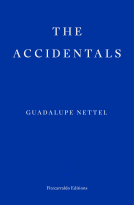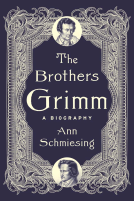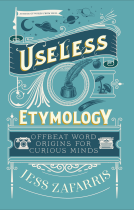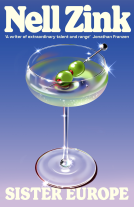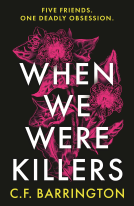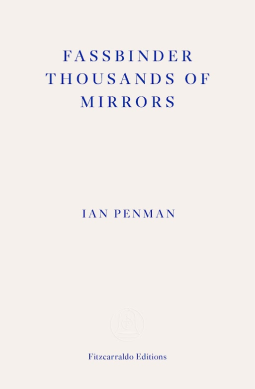
Fassbinder Thousands of Mirrors
by Ian Penman
This title was previously available on NetGalley and is now archived.
Send NetGalley books directly to your Kindle or Kindle app
1
To read on a Kindle or Kindle app, please add kindle@netgalley.com as an approved email address to receive files in your Amazon account. Click here for step-by-step instructions.
2
Also find your Kindle email address within your Amazon account, and enter it here.
Pub Date Apr 19 2023 | Archive Date Apr 19 2023
Talking about this book? Use #FassbinderThousandsofMirrors #NetGalley. More hashtag tips!
Description
Melodrama, biography, cold war thriller, drug memoir, essay in fragments, mystery – Fassbinder Thousands of Mirrors is cult critic Ian Penman’s long awaited first original book, a kaleidoscopic study of the late West German film maker Rainer Werner Fassbinder (1945–1982). Written quickly under a self-imposed deadline in the spirit of Fassbinder himself, who would often get films made in a matter of weeks or months, Fassbinder Thousands of Mirrors presents the filmmaker as a pivotal figure in the late 1970s moment between late modernism and the advent of postmodernism and the digital revolution. Compelling, beautifully written and genuinely moving, echoing the fragmentary and reflective works of writers like Barthes and Cioran, this is a story that has everything: sex, drugs, art, the city, cinema and revolution.
For fans of: Warren Ellis's Nina Simone Gun, Charlie Fox's This Young Monster, Will Ashon's Chamber Music.
Advance Praise
‘Ian Penman is an ideal critic, one who invites you in, takes your coat, and hands you a drink as he sidles up to his topic. He has a modest mien, a feathery way with a sentence, a century’s worth of adroit cultural connections at the ready, and a great well of genuine passion, which quickly raises the temperature.’
— Lucy Sante, author of The Other Paris
‘Ian Penman – critic, essayist, mystical hack and charmer of sentences like they’re snakes – is the writer I have hardly gone a week without reading, reciting, summoning to mind. The writer without whom, etc.’
— Brian Dillon, author of Affinities
Available Editions
| EDITION | Paperback |
| ISBN | 9781804270424 |
| PRICE | £12.99 (GBP) |
| PAGES | 200 |
Available on NetGalley
Featured Reviews
 Michael J, Educator
Michael J, Educator
Penman on Fassbinder is an intriguing match and as it turns out a really worthwhile one. This is a long meditation, divided into 450 short sections, on what Rainer Werner Fassbinder and his films and art meant, and still mean, to Penman. It's also much more - a celebration and to a certain extent an attempt at a rehabilitation of a figure he describes as "an urban poet in the turbulent, seeds-sown, messy era just before everything changed". This indicates how well the book captures a vanished, predigital world in all its complexity. Fassbinder only died in 1982 but it seems much longer ago. This is an excellent book if you're interested in Fassbinder, (German) culture in the 1960s and 1970s, or just really powerful writing.
 Reviewer 876149
Reviewer 876149
Included in a list of quotations informing Ian Penman’s piece is this observation from Jean Genet, “The idea was dreamed rather than thought…” one that seems a fitting description of Penman’s melancholic, idiosyncratic study of German filmmaker Rainer Werner Fassbinder. Part meditation, part biography, part film criticism, archivist, cultural critic and perennial outsider Penman’s restless, roving approach reflects Fassbinder’s own rampant unconventionality. Penman moves between thinking about Fassbinder as an individual and Fassbinder as both icon and iconoclast - queer, fiercely political, prolific, divisive, continually courting controversy with his obsessive ongoing critiques, his railing against the condition of post-WW2 Germany. Penman probes Fassbinder’s origins, his intricate network of influences from Doblin to Godard to Sirk to post-1968 gay politics. Alongside, inextricably intertwined with his consideration of Fassbinder, are Penman’s attempts to work out why Fassbinder has been so important in his own life. And at times it’s not clear if Penman writing about the film-maker or trying to recapture the spirit of a time and somehow come to terms with the losses of his own past.
Through Fassbinder too, Penman is able to delve into the relationship between cinema and ideology, beginning with the American movies flooding post-war Germany as part of a project designed to make occupation palatable; to counter any traces of National Socialism by promoting American values – however contradictory those might have been in the light of events like the bombing of Hiroshima. But Penman isn’t aiming for rigorous cultural or social history, his writing is more atmospheric and essayistic, at times not unlike Walter Benjamin's - another highly significant figure in Penman’s life. Instead Penman returns over and over again to themes of estrangement, mirroring, alienation and “dead-eyed” consumerism, as he sifts through fragments of the past, invoking the mood of the Cold War and a later Germany overshadowed by the Red Army Faction during the turbulent 70s, and out of all this the spectacular rise of New German Cinema.
Penman rejects linearity, laying out his ideas in a series of numbered paragraphs that interconnect through association and implication. Penman’s often cited as influencing writers and theorists from Simon Reynolds and Mark Fisher to Brian Dillon and there is something of their work apparent in his style, the way he deploys aspects of memoir, philosophy and critical theory. Although his work’s often more opaque than theirs, free-flowing, even outwardly anarchic, as he spits out references to Derrida, Barthes and Nabokov to Genet and Otto Dix, yet strangely disciplined. I find this one impossible to fully represent. It's sometimes incisive and illuminating, sometimes bewildering and self-indulgent, but never less than fascinating or stimulating.
